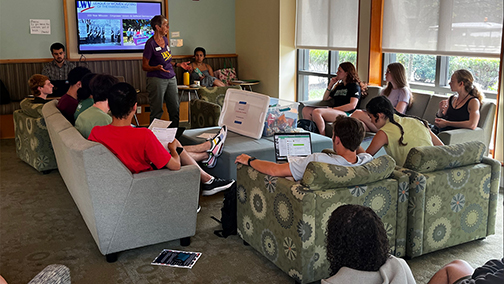The question “Why vote at George Mason University if you don’t know who is running and how it may impact you?” recently landed in Jennifer Victor’s inbox. Victor, an associate professor of political science, is running a project called “You’re the Voter” with the help of students in the Schar School’s Democracy Lab Learning Community. The question she received is at the core of her project: helping students and universities understand the importance of civic engagement.
You’re the Voter is a part voter mobilization, part research study, and part experiential learning opportunity. Undergraduate students are able to enroll if their instructors opt to include their class in the program. By participating in the study, students help research team members learn more about the dynamics of civic activity among college students—a historically challenging population to motivate to the polls.

According to Arina van Breda of the League of Women Voters of Fairfax, the Mason voting precinct in Merten Hall produced the lowest voter turnout in Fairfax last year. State and local elections typically have much lower turnout compared to elections where higher offices appear on the ballot.
“In Virginia, every year is an election year,” Tim Bynion, a Ph.D. candidate in political science and co-investigator on the project, said. Unlike most states, Virginia holds its state elections in odd-numbered years.
The You’re the Voter project aims to inform the Mason community that not only is 2023 an important election, but many Mason students can exercise their voting on campus because they reside in Fairfax County, or they can vote locally at their home precinct.
Many students believe they are not eligible to vote in local elections because they don’t possess a Virginia driver’s license or are already registered to vote in another state. The truth is if students live on or near campus, they are Virginia residents. As long as an individual is a legal voter (e.g., a U.S. citizen and at least 18 years old on Election Day), they have the right to vote in elections.
“On a day-to-day basis, local policy affects students’ lives more than national policies do so even if students are unfamiliar with the candidates or items on the ballot, learning enough about them to cast a ballot is important,” Victor said. “This is what makes democracies work.”
Because college students are a unique voting population, Victor and her team argue that universities have an obligation to help students exercise their civic rights. The study will help the team learn the most effective strategies universities can follow to stimulate civic engagement.
The You’re the Voter project is supported by the Office of Community Engagement and Civic Learning, a grant from the Student Vote Research Network, the League of Women Voters of Fairfax, and the Schar School of Policy and Government.
